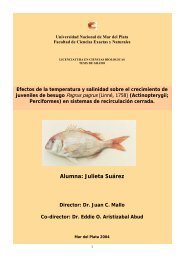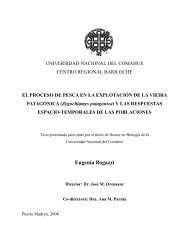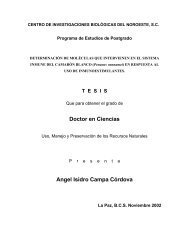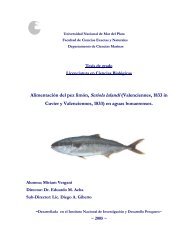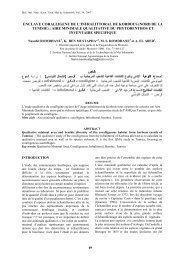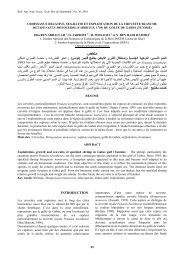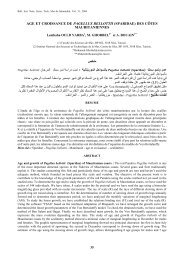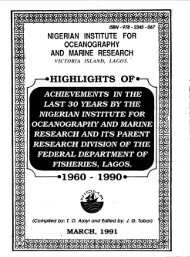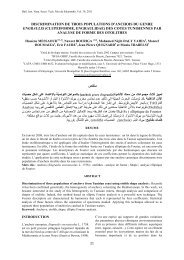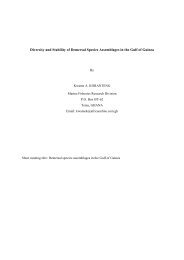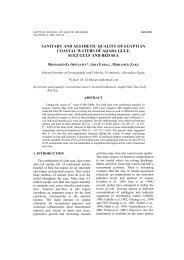Coastal vulnerability, resilience and adaptation to ... - OceanDocs
Coastal vulnerability, resilience and adaptation to ... - OceanDocs
Coastal vulnerability, resilience and adaptation to ... - OceanDocs
You also want an ePaper? Increase the reach of your titles
YUMPU automatically turns print PDFs into web optimized ePapers that Google loves.
<strong>Coastal</strong> Vulnerability, Resilience <strong>and</strong> Adaptation <strong>to</strong> Climate Change:<br />
An Introduc<strong>to</strong>ry Overview<br />
Richard J.T. Klein<br />
1. Introduction<br />
The work presented in this PhD thesis has not been carried out within a single, well-defined<br />
project. Instead, it integrates the results of a number of studies conducted from 1994 onwards,<br />
each of which had different clients <strong>and</strong> objectives. The common theme of the studies<br />
has been the description <strong>and</strong> analysis of elements that determine how coastal systems <strong>and</strong><br />
communities would <strong>and</strong> could respond <strong>to</strong> climate change <strong>and</strong>, in particular, how this response<br />
may be assessed as part of coastal <strong>vulnerability</strong> studies.<br />
<strong>Coastal</strong> zones are amongst the most dynamic natural environments on earth, providing a<br />
range of goods <strong>and</strong> services that are essential <strong>to</strong> human social <strong>and</strong> economic well-being.<br />
<strong>Coastal</strong> zones represent the narrow transitional zone between the world’s l<strong>and</strong> <strong>and</strong> oceans,<br />
characterised by highly diverse ecosystems such as coral reefs, mangroves, beaches, dunes<br />
<strong>and</strong> wetl<strong>and</strong>s. Many people have settled in coastal zones <strong>to</strong> take advantage of the range of<br />
opportunities for food production, transportation, recreation <strong>and</strong> other human activities provided<br />
here. A large part of the global human population now lives in coastal areas: estimates<br />
range from 20.6 per cent within 30 km of the sea <strong>to</strong> 37 per cent in the nearest 100 km <strong>to</strong> the<br />
coast (Cohen et al., 1997; Gommes et al., 1998; Nicholls <strong>and</strong> Small, 2002). In addition, a considerable<br />
portion of global economic wealth is generated in coastal zones (Turner et al.,<br />
1996). Many coastal locations exhibit a growth in population <strong>and</strong> income higher than their national<br />
averages (Carter, 1988; WCC’93, 1994), as well as substantial urbanisation (Nicholls,<br />
1995a).<br />
In the Second Assessment Report of the Intergovernmental Panel on Climate Change<br />
(IPCC), Bijlsma et al. (1996) noted that climate-related change in coastal zones represents<br />
potential additional stress on systems that are already under intense <strong>and</strong> growing pressure.<br />
The IPCC concluded that although the potential impacts of climate change by themselves may<br />
not always pose the greatest threat <strong>to</strong> natural coastal systems, in conjunction with other<br />
stresses they could become a serious issue for coastal societies, particularly in those places<br />
where the <strong>resilience</strong> of the coast has been reduced. This conclusion has been the main motivation<br />
behind my research, which has aimed at better underst<strong>and</strong>ing the <strong>vulnerability</strong>, <strong>resilience</strong><br />
<strong>and</strong> <strong>adaptation</strong> of coastal zones in the face of climate change.<br />
The insights gained in the various studies have been the basis of a number of peer-reviewed<br />
<strong>and</strong> published papers, six of which form the core of this PhD thesis. Each of these papers<br />
explores different aspects of coastal <strong>vulnerability</strong>, <strong>resilience</strong> <strong>and</strong> <strong>adaptation</strong> <strong>to</strong> climate<br />
change. This introduc<strong>to</strong>ry chapter provides the context for coastal <strong>vulnerability</strong> assessment<br />
by giving an overview of current stresses in coastal zones, as well as of the possible effects of<br />
climate change on coastal sustainability. It also explores how the three concepts that form<br />
the basis of this PhD thesis (<strong>vulnerability</strong>, <strong>resilience</strong> <strong>and</strong> <strong>adaptation</strong>) have been defined <strong>and</strong><br />
applied in other disciplines. Finally, this chapter defines the research objectives pursued in<br />
this thesis, outlines the methodological approach taken <strong>and</strong> introduces the six papers.<br />
Following the six peer-reviewed <strong>and</strong> published papers, a synthesis chapter aims <strong>to</strong> draw<br />
conclusions in the light of existing <strong>and</strong> emerging scientific <strong>and</strong> policy needs. The synthesis<br />
chapter also provides an agenda for research that can build on the findings of this PhD thesis.<br />
2. Sustainable development <strong>and</strong> global change in coastal zones<br />
This PhD thesis focuses on coastal <strong>vulnerability</strong>, <strong>resilience</strong> <strong>and</strong> <strong>adaptation</strong> <strong>to</strong> climate change.<br />
However, climate change is not the only challenge <strong>to</strong> sustainable development in coastal<br />
zones. Other developments taking place on a global scale also have a pervasive but immediate<br />
impact on coastal sustainability. These developments are associated with the many eco-<br />
1





